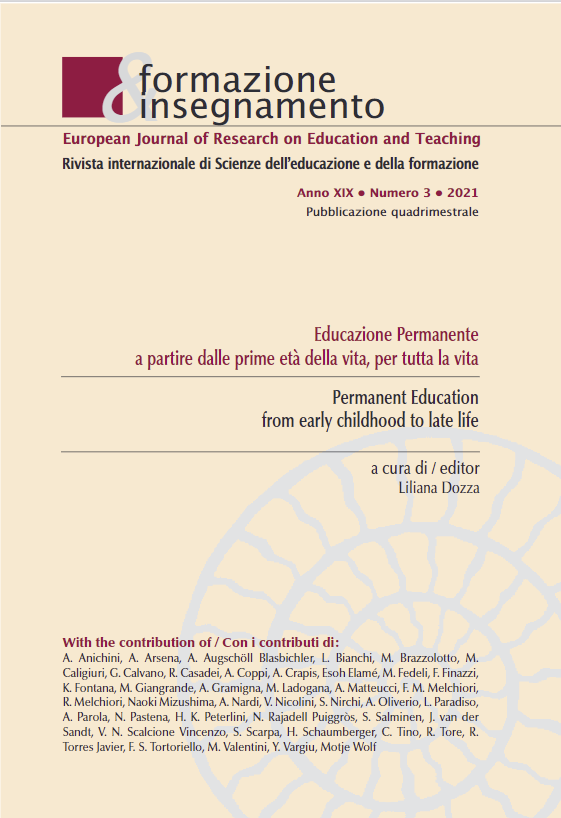Emotions and Empathy during the Pandemic in an International School in Madrid: A Case Study
DOI:
https://doi.org/10.7346/-fei-XIX-03-21_04Palavras-chave:
COVID-19, Primary Education, Empathy, Resilience, HabitsResumo
Emotions and empathy contribute to the development and formation of all people. These factors are most decisive in the developmental stages where the role of stimuli from the environment is also a determining factor. From this maxim, we present a paper that investigates a group of school pupils’ process of transformation regarding their emotional perspective of themselves and the situation that they have had to live through: that of the COVID-19 (SARS-CoV-2) pandemic. Taking into account that the focus of this research is the most significant moments in terms of emotional perception and the primary school students themselves, we deduce that evaluations can be carried out repeatedly and specific situations can be analysed. Consequently, we opt for a qualitative methodology with a single case study method. From this point and the data collected, the results relate to the dif-ferent phases that correspond with the most important events which steer us inevitably towards a “new normality”. Here we refer to events from the ceasing of all activities and free movement (March 2020) to the new situation one year later of inoculations by different vaccines (March 2021).
Referências
Ángeles Espinosa, M.A. (2020). Covid-19, Educación y Derechos de la Infancia en España. Revista Internacional de Educacion para la Justicia Social, 9(3), 245-258. https://doi.org/10.15366/riejs2020.9.3.013
Bisquerra, R. (testo); Punset, E. (prologo); (2015). Universo de emociones. Valencia: PalauGea Comunicación.
BOE. (2020a, 14 de marzo). Real Decreto 463/2020, de 14 de marzo, por el que se declara el estado de alarma para la gestión de la situación de crisis sanitaria ocasionada por el COVID-19. Boletín Oficial del Estado. Recuperado de: https://tinyurl.com/y59g72pg
Flick, U. (2012). Introducción a la Investigación Cualitativa. Madrid: Ediciones Morata S. L.
Fontana, K. (2012). La mediazione come supporto ai processi di sviluppo cognitivo. In Le migliori proposte operative su strategie di insegnamento/apprendimento (a cura di Ianes, D.) (pp. 138-139). Trento: Erickson.
Fontana, K. (2021). “Diario di campo”, appunti.
Ministerio de Sanidad-Ministerio de Educación y Formación Profesional. (2020). Medidas de prevención, higiene y promoción de la salud frente a Covid-19, para centros educa-tivos en el curso 2020-2021. Gobierno de España.
Minuto, M., Ravizza, R. (2020). Il lesson planning, consigli per l’uso. In Le Guide Sei (a cura di Fabbri, S., Masini, M. e Baccaglini, E.). S37-S49. Torino: Sei.
Monge, C., Gómez Hernández, P. y Jiménez Arenas, T. (2020). Cierre de Escuelas en Con-textos Vulnerables desde la Perspectiva de los Orientadores: Impacto en Zonas Rurales. Revista Internacional de Educación para la Justicia Social, 9(3e), 371-385. https://doi. -org/10.15366/riejs2020.9.3.020
Ozamiz-Etxebarria, N., Dosil Santamaría, M., Idoiaga Mondragon, N., Berasategi Santxo, N. (2021). Estado emocional del profesorado de colegios y universidades en el norte de España ante la COVID-19. Rev Esp Salud Pública; 95: 15 de febrero e202102030. www.mscbs.es/resp
Rivera, G y Tonatiuh, A (2009). El método de los estudios de caso. En Reyes, G (comp.). Acer-camientos conceptuales y metodológicos para el estudio de la realidad agropecuaria y rural de México. Toluca, México: Universidad Autónoma del Estado de México.
Rodríguez Torres, J., & Gómez Jiménez, O. (2021). La atención a la diversidad durante la COVID-19: revisión legislativa de las medidas según LOMCE.Vivat Academia. Revista de Comunicación, 154, 1-19 ISSN: 1575-2844 http://doi.org/10.15178/va.2021.154.e1241
Yin, R. K. (2003 3rd ed). Case Study Research. Design and Methods. Tousand Oaks, CA, Lon-don. UK, New Delhi (India): SAGE Publication Inc. UNESCO. (2020). Coalición mundial para la educación Covid-19. UNESCO. UNICEF. (2020). Covid-19: Proteger la salud en las aulas. Principios básicos para asegurar el derecho a la salud al reabrir los centros educativos. UNICEF España.
Downloads
Publicado
Como Citar
Edição
Seção
Licença
Copyright (c) 2021 Pensa MultiMedia

Este trabalho está licenciado sob uma licença Creative Commons Attribution 4.0 International License.
Formazione & insegnamento é distribuído sob a Attribution 4.0 International (CC BY 4.0).
Para obter mais detalhes, consulte nossa Política de Repositório e Arquivamento, bem como nossos Termos de Direitos Autorais e Licenciamento.





